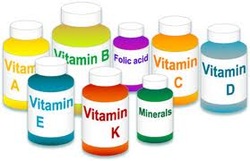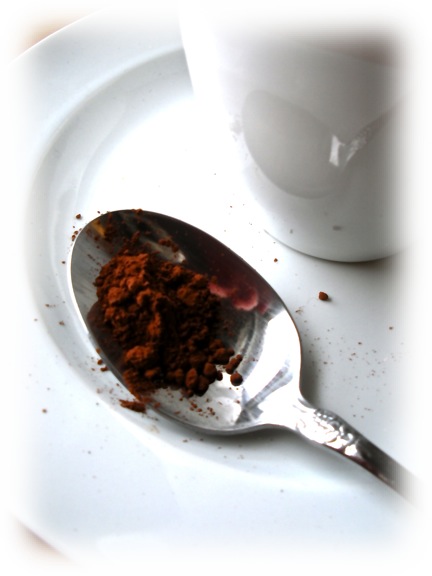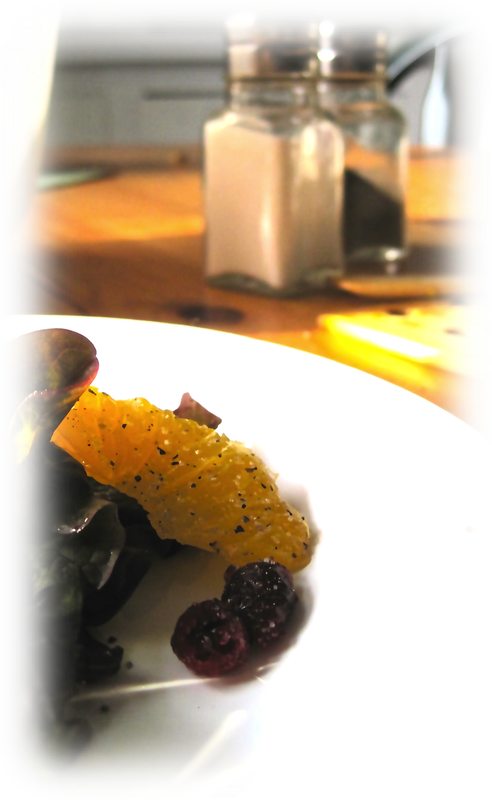
Ever wondered what is the hype about vitamins all about? Supplement companies, nutritionist, doctors, and your next-door neighbor all have something to say about them, but why should you care? Simply put vitamins are compounds that help your body function. Different vitamins help your body in different ways, and you need all of them for your body to work well. Actually the name vitamin came from combining "vital" and "amine" aka vital organic compound. Vitamins are vital, but what do they do that is so important? Let me tell you.
Vitamin A
Vitamin E
Vitamin D
Vitamin K
Vitamin B1 aka Thiamine
Vitamin B2 aka Riboflavin
Vitamin B3 aka Niacin
Vitamin B5 aka Pantothenic Acid
Vitamin B6 aka Pyridoxine
Vitamin B9 aka Folate aka Folic acid
Vitamin B12 aka Cyanocobalamin
Vitamin C aka Ascorbic Acid
So what?
Basically you need to make sure you are eating vitamins so that your body has what it needs to get energy from your food, allow your brain to function, allow your DNA to build your body, and to not get freaky deficiency diseases. If you enjoy living a relatively normal, happy, healthy life you should care about vitamins
Do I need a supplement then?
Odds are no. Because you live in a developed country and have access to an abundance of different foods, including fortified grains and dairy products, you'll most likely be fine. I do recommend that women who trying to get pregnant take a prenatal multi-vitamin. To make a very long story short, this is because a growing fetus needs vitamins and minerals right from the start, and if it doesn't have them when it needs them it can cause major birth defects. If a soon to be mom is pregnant and not feeling well, she likely isn't eating as well which means she could be lower in some vitamins and minerals. This is a bad combination that could have a very sad outcome. Don't risk it; take a prenatal vitamin.
Is more better?
Not really. Enough is enough. There is a 100% for a reason. If you take more than you need of water soluble vitamins they are simply excreted (you pee them out) and if you take more than you need of fat soluble vitamins they can be toxic. So stick with a multivitamin that has only 100% of what you need.
PS
Check out this video. It makes me laugh every time I watch it.
Vitamin A
- Helps with vision (especially night vision), growth, skin, immune function, and reproduction.
- If you don't get enough it can cause night blindness (not make you need to wear glasses)
- Sources: Dark leafy green vegetables, cantaloupe, fish, liver, carrots, fortified milk, apricots, sweet potatoes (think orange things and organ meat)
Vitamin E
- Antioxidant that protects the walls of your cells because, unlike other antioxidants, vitamin E is fat soluble, and the cells walls are made of fat
- If you are low it can cause a type of anemia (weird, hu?)
- Sources: Vegetable oils, whole grans, green vegetables (think plant oils)
Vitamin D
- Helps maintain calcium and phosphorus levels, helps with bone development
- If you are low it can cause weak bones
- Sources: Sunlight, egg yolks, fortified milk (think sun and the yellow of an egg...?)
Vitamin K
- Helps your blood clot
- If you are low your blood won't clot as well leading to excessive bleeding
- Sources: Kale, spinach broccoli, vegetable oils and the bacteria in your intestines (think dark leafy greens)
Vitamin B1 aka Thiamine
- Helps you metabolize carbohydrates and helps your nerves function (FYI the higher your diet is in carbohydrate the more B1 you need)
- If you are low you could have muscle weakness, feel tired, cranky, and have loss of memory (sounds like PMS to me...), or if very low it can cause beriberi
- Sources: Grains, pork, liver, egg yolk, wheat germ, nuts and red meat (I've got no tips for remembering that one)
Vitamin B2 aka Riboflavin
- Helps your body metabolize food aka helps your body get energy from the food you eat
- If you are low you can get server chapped and cracked lips, mouth and tongue (weird, right?)
- Sources: animal protein (think meat and milk)
Vitamin B3 aka Niacin
- Helps with growth, reproduction, metabolism of your food
- If you are low it leads to pellagra (symptoms include diarrhea, dermatitis, dementia and death)
- Sources: Dairy, poultry, fish, meat, nuts, eggs, legumes, and enriched grains (think protein foods)
Vitamin B5 aka Pantothenic Acid
- Helps your body breakdown food in order to get energy
- If you are low you can have decreased appetite
- Sources: All plant and animal foods, with the best sources being eggs, kidney, liver, salmon, and yeast (remember, its every where!)
Vitamin B6 aka Pyridoxine
- Helps to decrease your risk of heart disease, is essential for normal brain development and function, helps produce DNA, helps your body absorb B12, and helps your muscle cells (basically a vitamin superstart)
- If you are low you can get anemia and it can cause neural tube defects
- Sources: Meat, wheat, corn, yeast, pork liver (sorry, once again, no tips on remembering that)
Vitamin B9 aka Folate aka Folic acid
- Helps your body use proteins to build your body, helps produce red blood cells, helps build DNA, helps with tissue growth and cell function
- If you are low it can cause anemia and neural tube defects
- Sources: Beans, legumes, citrus fruits, whole grains, dark green leafy vegetables, poultry, pork, shellfish, liver (remember dark leafy greens and beans)
Vitamin B12 aka Cyanocobalamin
- Helps build DNA, helps develop red blood cells
- If you are low it leads to anemia (usually only a problem with specific diseases or when eating a strict vegan diet for years)
- Sources: Animal proteins (think milk and meat)
Vitamin C aka Ascorbic Acid
- Collagen production, immunity, wound healing and iron absorption
- If you are low you can get scurvy (aka a lack of collagen)
- Sources: Citrus fruit, tomatos, melon, peppers, dark greens and yellow vegetables (think tangy produce like citrus fruit, tomatoes and peppers)
So what?
Basically you need to make sure you are eating vitamins so that your body has what it needs to get energy from your food, allow your brain to function, allow your DNA to build your body, and to not get freaky deficiency diseases. If you enjoy living a relatively normal, happy, healthy life you should care about vitamins
Do I need a supplement then?
Odds are no. Because you live in a developed country and have access to an abundance of different foods, including fortified grains and dairy products, you'll most likely be fine. I do recommend that women who trying to get pregnant take a prenatal multi-vitamin. To make a very long story short, this is because a growing fetus needs vitamins and minerals right from the start, and if it doesn't have them when it needs them it can cause major birth defects. If a soon to be mom is pregnant and not feeling well, she likely isn't eating as well which means she could be lower in some vitamins and minerals. This is a bad combination that could have a very sad outcome. Don't risk it; take a prenatal vitamin.
Is more better?
Not really. Enough is enough. There is a 100% for a reason. If you take more than you need of water soluble vitamins they are simply excreted (you pee them out) and if you take more than you need of fat soluble vitamins they can be toxic. So stick with a multivitamin that has only 100% of what you need.
PS
Check out this video. It makes me laugh every time I watch it.



